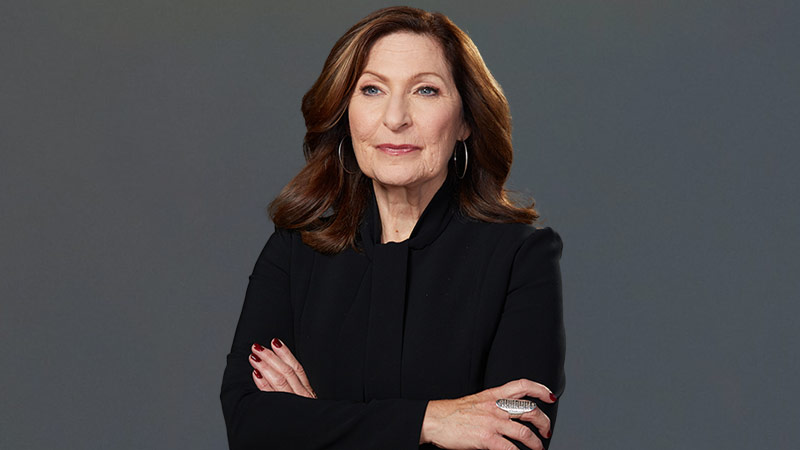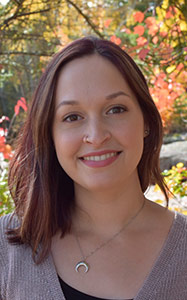The shame is not yours to carry: A conversation with Canadian journalist and survivor of intimate partner violence, Anna Maria Tremonti
Author: Jay Michaud and Hilary Creamer Robinson
Posted on Dec 9, 2024
Category: UNB Fredericton

For decades, Canadian journalist Anna Maria Tremonti traveled the world telling other people’s stories; of those in power, of those who abuse their power, and of those impacted by such abuse.
In 2022, she shared her own story of intimate partner violence on her podcast “Welcome to Paradise,” with the hope it might help other survivors of gender-based violence feel less alone.
On Dec. 6, Tremonti will speak at the University of New Brunswick’s (UNB) National Day of Remembrance and Action on Violence Against Women ceremony.
The event, organized by UNB Diversity Within Engineering, with support from the Muriel McQueen Fergusson Centre for Family Violence Research, the UNB faculty of arts, the Government of New Brunswick's Women's Equality Branch and the Office of the President, is held each year in honour of the 14 women killed during the Montréal Massacre at École Polytechnique in 1989.
Tremonti recently spoke with Dr. Jay Michaud, an advocate, academic, and program coordinator responding to the needs of survivors of gender-based violence. Currently completing a Master of Education in counselling at UNB, Michaud is vice president of the Fergusson Foundation and holds a PhD from the University of Waterloo.
In the Q&A, Tremonti speaks of the importance of continuing to honour the women killed on Dec. 6, 1989, how Fredericton was the place she found agency, and why she chose to share her story publicly.
Dr. Jay Michaud (JM): What is the significance for you to speak on Dec. 6 at the commemoration event for the 14 women who were lost to the Montreal Massacre?
Anna Maria Tremonti (AMT): The Montreal Massacre was a turning point, I think, for so many of us. It was the kind of carnage which we hadn't really seen in Canada, and such a marker of gender-based violence.
I've talked to many people [like Naomi Klein] who say that was the moment they became a feminist.
I was a reporter in the Parliament Hill Bureau of CBC in Ottawa at the time. I can still see myself with other people huddled around a monitor, watching and learning like everybody else.
In 1989, women populated the bureau in critical numbers. The next day, every single woman was saying, this is violence against women. Every single man—and these were smart men—every one of them said no, it was violence, it was horrifying, but it’s not violence against women.
It remains for me a marker in time of understanding why it mattered to have women in newsrooms, because we saw things men did not see. It’s why diversity beyond gender matters in newsrooms; why racial, cultural and religious diversity matters; because you see things others don’t see, and you bring it forward for society to understand and form an opinion.
We have to call these things what they are in order to identify them and hope that they do not happen again.
Those young women had so much hope for their future and so many plans, and that was just obliterated. Their families have lived with [their loss]. I don’t want to diminish the suffering of these families, but I hope they take comfort in understanding that so many of us remember that time.
JM: What does returning to Fredericton on Dec. 6 mean to you?
I started my CBC career in Fredericton. For my first job interview I had to hide the bruises around my neck from the beating I had received a few days earlier.
Fredericton was the place where I realized I had agency and I didn't have to continue to live like that. It took a while, but I got the CBC job, and it opened another world to me. It allowed me to [tell] stories about other people and it allowed me to get on my feet, both career-wise and economically. It was a place where I realized I could heal and move away. When I left, I was in a better place.
JM: You shared your story in a very brave and vulnerable way in your podcast, “Welcome to Paradise.” What led you to eventually share your story in this way?
I had hoped that [by using my privilege] to tell my story, those going through their own experiences with intimate partner violence or gender-based violence would feel less alone.
For many people that is a very, very difficult journey. I wanted to use my story to talk about what I went through and how I came out the other side. To help people understand they are not alone.
The more I worked on my story, the more I realized I still carry shame—about my silence, about the fear of being judged. I realized that by talking about it, I could get rid of it, because I realized it wasn’t mine.
JM: What message do you have for survivors who are currently living through intimate partner or gender-based violence?
You're not alone. There are other people going through this. There are ways to get out. You deserve a life that makes you happy. You have done nothing to deserve this. If you are blaming yourself, it is not your fault. What you’re going through is real. The shame is not yours to carry.
It is worth wanting a better life where you feel truly loved and appreciated. People who have gone through this have found joy and the pain will dissipate.
You’re worth it. You are worthy of happiness.
If you or someone you know is experiencing intimate partner, domestic or gender-based violence, see Support Services for Victims of Abuse or call 211 to find support.

